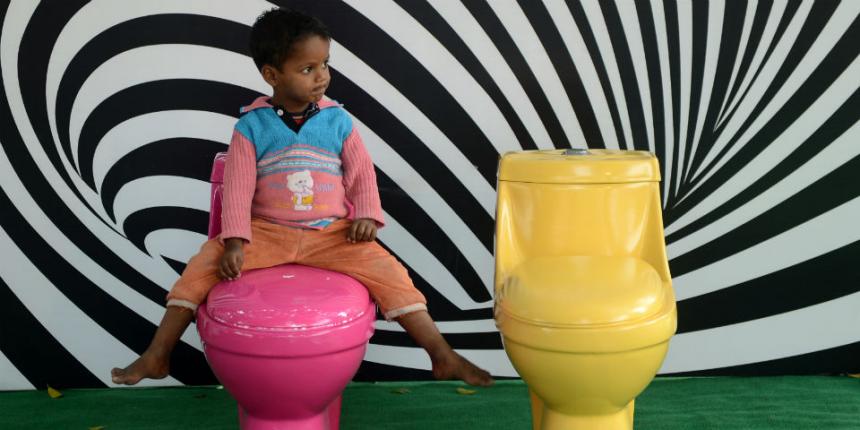Don’t snicker: Open defecation is one of the world’s most stubborn problems. And the inability to adopt even Victorian-era sanitation is keeping India from being a superpower.
Across an arid summer moonscape in middle-of-nowhere rural Zambia, villagers gather around Chief Macha of Choma to discuss a pressing, unspoken issue: shit.
“We have to start talking about poop,” says Macha, who prefers the title King of Shit. “Poop is our biggest enemy right now.”
For the past six years, Macha has gone from village to village campaigning on a simple slogan: “No shit, please! One family, one toilet.” He has helped families build their own toilets and has lobbied the Zambian government for more assistance. According to UNICEF, his tribal area is one of the first rural African villages to gain “open defecation free” status — euphemistic speak for not pooping in the open. Zambia hopes to have a toilet in every household by 2030, a tall order for a country where more than 52 percent “go” outdoors.
“All these aid people come here, giving us mosquito nets … pills. OK, that’s great. But what happens when everyone shits outside?” he says, critiquing health development efforts. “We need to cover the basics first.”
In the development world, those basics have been woefully covered. Despite progress on the United Nations’ Millennium Development Goals (MDGs), sanitation — one of the most powerful indicators of a country’s state of human development — has fallen by the wayside. An estimated 1 billion people worldwide practice open defecation, with the highest rates in India, Indonesia, Pakistan, Ethiopia, and Nigeria.
“In terms of the MDGs, we’re most behind in sanitation,” says Louise Maule, a sanitation and hygiene specialist at UNICEF, which is spotlighting sanitation through its second annual World Toilet Day on Nov. 19. In July, the U.N. released a report calling for more sanitation funding.
“We’re trying to ramp up the work. We want to accelerate the results,” she said. “Sanitation is at the core of dignity and equity.”
It’s also at the core of enormous health and economic costs.
Open defecation is a major contributor to the spread of diseases, especially diarrhea, the second-leading global cause of death among children under 5. Macha’s approach has already had huge implications for disease control, with the local Macha Mission Hospital noting a significant reduction in diarrheal disease cases since he started campaigning in 2008.
What’s more, women are disproportionately affected by sanitation inequities: In sub-Saharan Africa, one-third of girls drop out of school once they start menstruating due to inadequate sanitation access. In India, open defecation puts women at greater risk of sexual harassment and assault.
Despite the horrendous statistics, development workers and entrepreneurs say it has been a struggle to get sanitation off the back burner. Open defecation remains the stinky stepsister of the health development world, overshadowed by star-studded issues such as access to clean water.
“Sanitation isn’t sexy,” says entrepreneur John Kluge, who co-founded the initiative Toilet Hackers four years ago. He says he was once escorted off the premises of a swanky New York City Fashion Week show for discussing the issue. “But we’re trying to get it on the development radar, to get people to give a shit. It’s the base level of all development problems.”
The initiative is aimed at building a network of 10 million toilets in 10 years, providing access to sanitation to 250 million people. In 2012, it co-hosted the first worldwide Sanitation Hackathon in partnership with the World Bank and the Bill & Melinda Gates Foundation, which produced over 180 prototypes for sanitation-related problems.
But they soon realized that the medium isn’t the message — simply providing toilets isn’t enough.
“The behavioral component to open defecation is the white elephant in the room,” says Leith Greenslade, a vice chair at the MDG Health Alliance, a special initiative of the Office of the U.N. Secretary-General’s Special Envoy for Financing the Health Millennium Development Goals and Malaria.
“Gates and other organizations first started with a huge focus on the technology, as though if we could just make and provide a great toilet, then it would excite everyone and the problem would be solved.”
Not so much.
In fact, in at least five of India’s poorest states, the majority of people in households with a government-issue latrine don’t use it, according to a survey by the Research Institute for Compassionate Economics. Similarly, a recent study by the Lancet medical journal found that increased latrine coverage in rural India may have had little impact on health.
“We need to focus on the demand side,” Greenslade says. “We need to focus on the resistance to the toilet.”
India is at the disastrous vortex of low demand and high risk, with the world’s highest concentration of open defecators (some 600 million people) and consequently, according to recent studies, the highest prevalence of children who suffer from stunting — some 48 percent of children. In 1925, Mahatma Gandhi famously said, “Sanitation is more important than independence.”
Adding to the difficultly in combating open defecation is that it’s not a mere matter of habit, but preference. The Research Institute for Compassionate Economics’ Sanitation Quality, Use, Access and Trends (SQUAT) survey revealed a strong preference for open defecation, with half of people who defecate in the open saying that they do so because it is pleasurable and comfortable.
READ MORE FROM FOREIGN POLICY….










